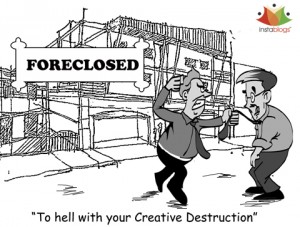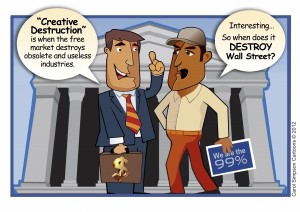I found this brief blog article interesting given our discussion of Singapore in class a few weeks ago. It notes that Singapore is home to a growing base of startup entrepreneurial activity, especially in the technology sector. Relating to our recent discussion of the role of law in fostering entrepreneurial activity and innovation, I wonder to what degree Singapore’s tightly controlled legal system has helped foster this entrepreneurial growth, or whether it is merely a byproduct of Singapore’s economic success.
Monthly Archives: February 2014
Is American economic growth over? Not so fast …
“Gordon’s paper has received widespread attention for his provocative thesis that U.S. productivity growth is essentially over and that the average American will be no better off, and likely worse off in the future.”
Entrepreneurship and Agency Capture Theory
Reading some of the materials so far discussing how the law should be to encourage innovation and entrepreneurs I cannot help but think of how this sort of encourages capture theory in terms of agencies. It seems like the goal would be to have agencies create policy that serve industry and potentially limit themselves in a fashion that is textbook capture theory in administrative law.
Creative destruction, redux …
Mitt Romney’s private equity past puts “creative destruction” in the spotlight…
(C) Carol Simpson
From Kendall Wilson (via email): “I think an interesting discussion lies around creative destruction and constantly shifting of companies, technologies and wealth, and unemployment in America. It seems that there could be a gap for law to fill, in order to protect those affected by massive job cuts.”
Tech Company General Counsel Talking Innovation
This article provides an interesting perspective on the role of a company’s lawyers in fostering innovation.
http://www.utsandiego.com/news/2013/Dec/23/qualcomm-counsel-talks-innovation/?#article-copy
Why Great Companies Fail
This is an interesting article, in which TIME interviews author Jim Collins about the lessons he learned while writing his book, How the Mighty Fall: And Why Some Companies Never Give In.
“There are three things worth keeping in mind about any great enterprise that eventually falls. Number one, the seeds of decline are usually in place long before decline becomes visible — like a disease where you look strong on the outside but you’re already ill on the inside. Second, we tend to think decline happens because of complacency — people just sitting still, not being aggressive or innovating. But we found there’s often tremendous change and innovation leading right up to the point of fall. It’s overreaching: undisciplined growth, undisciplined risk-taking. Finally, I was surprised by how far you really can fall and still come back — it’s one of the most wonderful things to come from this work. The tendency for many of us might be to give up too early.”
“possibly the most inspired piece of legislation …”
” … to be enacted in America over the past half-century” (The Economist)
More about Bayh-Dole here, in The New England Journal of Medicine. A very recent and very short piece arguing for needed changes to Bayh-Dole:
A little bit about Bayh-Dole
As we’ll be spending quite a bit of time discussing innovation, and as an accompaniment to Dick Cox’s presentation tomorrow (2/25/14), I thought I would post some information about the 1980 Bayh-Dole Act, which created opportunities for universities (and other institutions receiving federal research dollars) to own and commercialize their intellectual property.
You’ll want to pay particular attention to the rotating images in the upper-right hand corner of the page, which give some examples of novel inventions commercialized by the universities where they were developed.
Response to “Top 10 Reasons Why Entrepreneurs Hate Lawyers”
I found an interesting article written in response to “Top 10 reasons why entrepreneurs hate lawyers” that offers advice on how to work with a lawyer at a startup. See the article here.
I like this article because it shows the value lawyers provide outside the traditional “legal advisor role.” One example mentioned in the article is the fact that lawyers can be a great source of “deal flow.” After our discussion in class and after reading the various articles on this topic, it seems to me that lawyers struggle with entrepreneurs because we don’t do a good job of showing value. To many, we are looked at as expensive and arguably unnecessary “buzz kills” that provide little value beyond providing legal protection that may or may not be needed in the future. We need to do a better job communicating why what we do is important, and focus on ways to better display and ultimately provide value. The article may help at least provide food for thought on how to structure your practice or market yourself for those who plan on entering this area.


